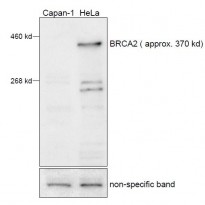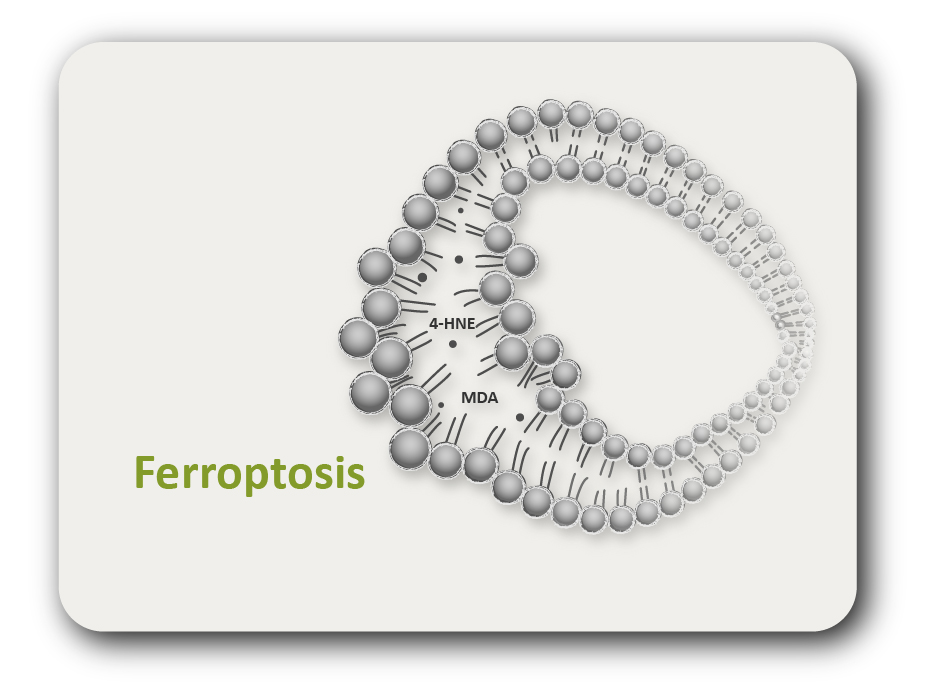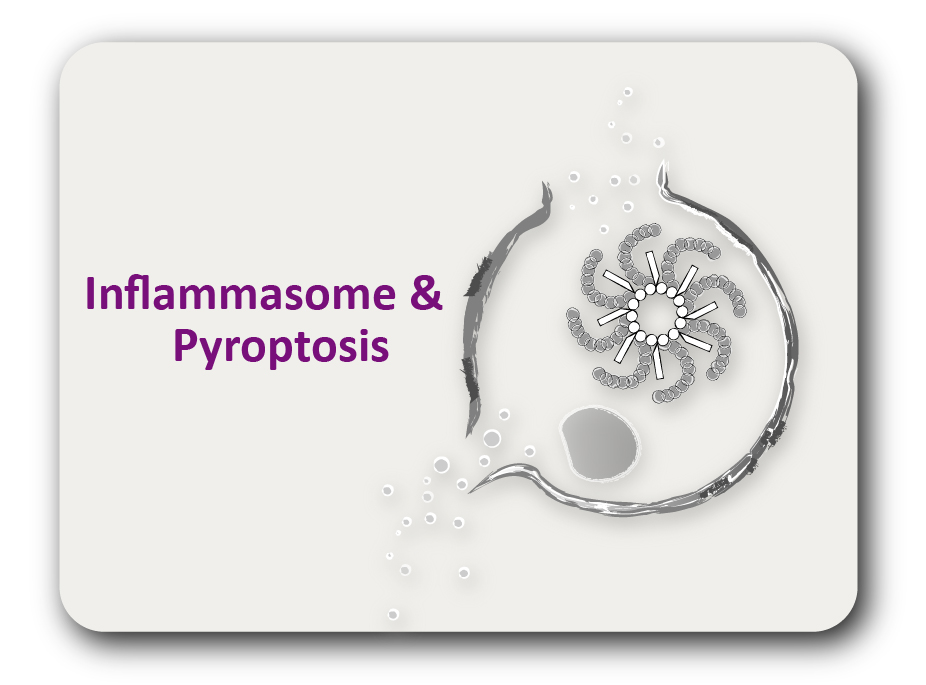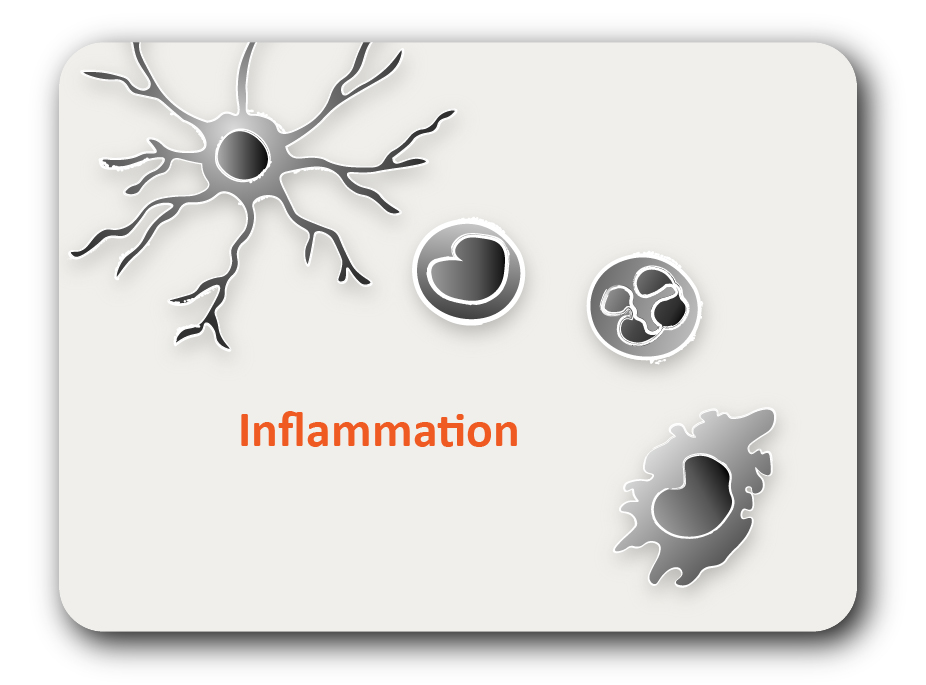ARG10523
anti-BRCA2 antibody
anti-BRCA2 antibody for ChIP,Flow cytometry,Immunoprecipitation,Western blot and Human,Mouse
Cancer antibody; Gene Regulation antibody
概述
| 产品描述 | Rabbit Polyclonal antibody recognizes BRCA2 |
|---|---|
| 反应物种 | Hu, Ms |
| 应用 | ChIP, FACS, IP, WB |
| 宿主 | Rabbit |
| 克隆 | Polyclonal |
| 同位型 | IgG |
| 靶点名称 | BRCA2 |
| 抗原物种 | Human |
| 抗原 | Synthetic peptide around the C-terminus of Human BRCA2 (NP_000050.2) |
| 偶联标记 | Un-conjugated |
| 別名 | XRCC11; FAD1; GLM3; PNCA2; BRCC2; FACD; FANCD; BROVCA2; FANCD1; Breast cancer type 2 susceptibility protein; Fanconi anemia group D1 protein; FAD |
应用说明
| 应用建议 |
|
||||||||||
|---|---|---|---|---|---|---|---|---|---|---|---|
| 应用说明 | * The dilutions indicate recommended starting dilutions and the optimal dilutions or concentrations should be determined by the scientist. | ||||||||||
| 阳性对照 | HeLa and U2OS human cells |
属性
| 形式 | Liquid |
|---|---|
| 纯化 | Affinity purified. |
| 缓冲液 | PBS |
| 浓度 | 1.47 mg/ml |
| 存放说明 | For continuous use, store undiluted antibody at 2-8°C for up to a week. For long-term storage, aliquot and store at -20°C or below. Storage in frost free freezers is not recommended. Avoid repeated freeze/thaw cycles. Suggest spin the vial prior to opening. The antibody solution should be gently mixed before use. |
| 注意事项 | For laboratory research only, not for drug, diagnostic or other use. |
生物信息
| 数据库连接 |
Swiss-port # P51587 Human Breast cancer type 2 susceptibility protein Swiss-port # P97929 Mouse Breast cancer type 2 susceptibility protein homolog |
|---|---|
| 基因名称 | BRCA2 |
| 全名 | breast cancer 2, early onset |
| 背景介绍 | Inherited mutations in BRCA1 and this gene, BRCA2, confer increased lifetime risk of developing breast or ovarian cancer. Both BRCA1 and BRCA2 are involved in maintenance of genome stability, specifically the homologous recombination pathway for double-strand DNA repair. The BRCA2 protein contains several copies of a 70 aa motif called the BRC motif, and these motifs mediate binding to the RAD51 recombinase which functions in DNA repair. BRCA2 is considered a tumor suppressor gene, as tumors with BRCA2 mutations generally exhibit loss of heterozygosity (LOH) of the wild-type allele. [provided by RefSeq, Dec 2008] |
| 生物功能 | Involved in double-strand break repair and/or homologous recombination. Binds RAD51 and potentiates recombinational DNA repair by promoting assembly of RAD51 onto single-stranded DNA (ssDNA). Acts by targeting RAD51 to ssDNA over double-stranded DNA, enabling RAD51 to displace replication protein-A (RPA) from ssDNA and stabilizing RAD51-ssDNA filaments by blocking ATP hydrolysis. Part of a PALB2-scaffolded HR complex containing RAD51C and which is thought to play a role in DNA repair by HR. May participate in S phase checkpoint activation. Binds selectively to ssDNA, and to ssDNA in tailed duplexes and replication fork structures. May play a role in the extension step after strand invasion at replication-dependent DNA double-strand breaks; together with PALB2 is involved in both POLH localization at collapsed replication forks and DNA polymerization activity. In concert with NPM1, regulates centrosome duplication. Interacts with the TREX-2 complex (transcription and export complex 2) subunits PCID2 and DSS1, and is required to prevent R-loop-associated DNA damage and thus transcription-associated genomic instability. Silencing of BRCA2 promotes R-loop accumulation at actively transcribed genes in replicating and non-replicating cells, suggesting that BRCA2 mediates the control of R-loop associated genomic instability, independently of its known role in homologous recombination (PubMed:24896180). [UniProt] |
| 研究领域 | Cancer antibody; Gene Regulation antibody |
| 预测分子量 | 384 kDa |
| 翻译后修饰 | Phosphorylated by ATM upon irradiation-induced DNA damage. Phosphorylation by CHEK1 and CHEK2 regulates interaction with RAD51. Phosphorylation at Ser-3291 by CDK1 and CDK2 is low in S phase when recombination is active, but increases as cells progress towards mitosis; this phosphorylation prevents homologous recombination-dependent repair during S phase and G2 by inhibiting RAD51 binding. Ubiquitinated in the absence of DNA damage; this does not lead to proteasomal degradation. In contrast, ubiquitination in response to DNA damage leads to proteasomal degradation. |
检测图片 (1) Click the Picture to Zoom In








